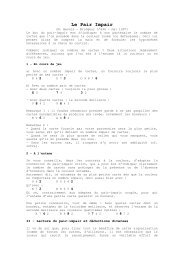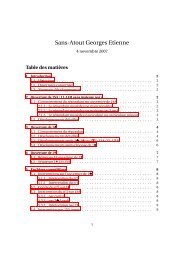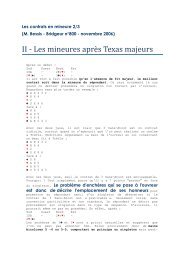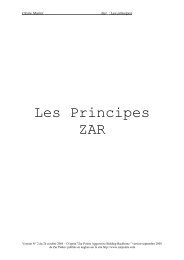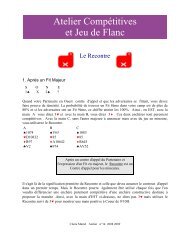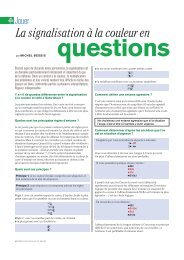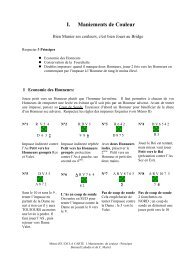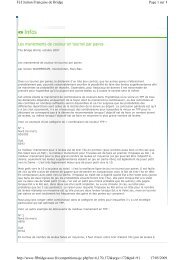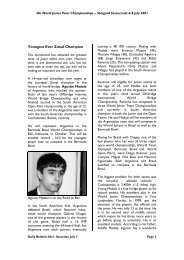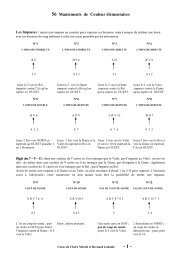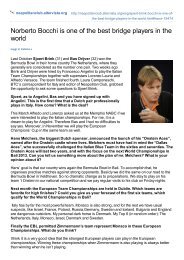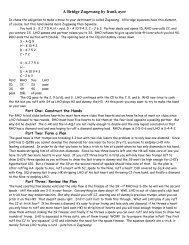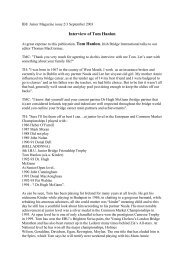Kate's rules to live by courtesy of K.T. McCallum PDF - Claire Bridge
Kate's rules to live by courtesy of K.T. McCallum PDF - Claire Bridge
Kate's rules to live by courtesy of K.T. McCallum PDF - Claire Bridge
Create successful ePaper yourself
Turn your PDF publications into a flip-book with our unique Google optimized e-Paper software.
Courtesy <strong>of</strong> K.T.<strong>McCallum</strong><br />
KATE’S RULES TO LIVE BY<br />
You’ve probably heard some, if not most, <strong>of</strong> these before. But,<br />
depending upon your level and your experience, perhaps some may be<br />
new <strong>to</strong> you. I hope you’ll give them a try. They work!<br />
1. BID MORE ON THE FIRST ROUND. Whenever possible, "Get it out <strong>of</strong><br />
your system on the first round <strong>of</strong> bidding" while it’s still<br />
safe <strong>to</strong> do so.<br />
2. GET IN AND GET OUT EARLY. If you don’t find a fit, get out <strong>of</strong><br />
the bidding.<br />
3. MAKE THE OPPONENTS MAKE THE LAST GUESS – NOT YOU. On highly<br />
competitive deals, bid as high as you are willing <strong>to</strong> go<br />
immediately, then get out and watch them deal with the problem.<br />
4. GIVE THE OPPONENTS A PROBLEM WHENEVER YOU CAN DO SO WITH<br />
RELATIVE SAFETY. If they have no problems, they will play<br />
well. If they have problems <strong>to</strong> cope with, then, no matter how<br />
good they are, they won’t be able <strong>to</strong> solve them all.<br />
5. DON'T SELL OUT AT THE 2-LEVEL WHEN THE OPPONENTS HAVE AN 8-CARD<br />
FIT. However, if you think that either side may have no 8-card<br />
fit it is correct <strong>to</strong> sell out at the two-level.<br />
6. DON’T PLAY TO TRICK ONE UNTIL YOU HAVE A PLAN. Applies both <strong>to</strong><br />
defenders and <strong>to</strong> declarer. If you don’t know what you’re<br />
playing for, don’t play!<br />
7. NEVER MAKE A PENALTY DOUBLE OF A PART-SCORE WITHOUT FOUR<br />
TRUMPS. (That means never!)<br />
8. LIMIT YOUR HAND WHENEVER YOU CAN. Partner knows the<br />
partnership level, and the bidding goes smoothly from here.<br />
9. NEVER LIE ABOUT TRUMP LENGTH. If you do, partner cannot make<br />
winning LOTT decisions. Or, he will choose the wrong trump<br />
suit. Or, he will misdefend because he has the wrong count.<br />
10. WHEN YOU HAVE A RAISE, RAISE. Whenever you can, raise<br />
your partner’s suits.
11. WHEN YOU KNOW WHAT’S TRUMP, TELL PARTNER. He makes better<br />
decisions when he knows.<br />
12. WHEN YOU KNOW WHAT TO DO – DO IT. Don’t make partner<br />
guess.<br />
13. BID YOUR LONG SUITS - DON’T MAKE A TAKEOUT DOUBLE.<br />
14. BID YOUR FIVE-CARD MAJORS – DON’T MAKE A TAKEOUT DOUBLE.<br />
15. IF YOU KNOW THAT YOU DON’T WANT YOUR DOUBLE TO END THE<br />
AUCTION – DON’T DOUBLE. Find another bid. Perhaps 1NT or 2NT<br />
takeout (or 4NT), or a flexible cue-bid or a natural bid.<br />
16. DON’T BALANCE! There are exceptions, <strong>of</strong> course – e.g.,<br />
when they have found a fit and are passed out at the two-level.<br />
But, as a general rule, balancing is losing bridge. Bid your<br />
hand on the first round, before they know what <strong>to</strong> do.<br />
17. LONG SUITS FIRST! With a 6/5, open or respond in the sixcard<br />
suit. Similarly, with 4/5 in the minors, try <strong>to</strong> open 1C<br />
if you can – open 1D only when you must.<br />
18. WITH WEAKNESS, DON’T PLAY IN NOTRUMP – FIND A TRUMP FIT.<br />
When we have around half the high cards (or less), no spots,<br />
and no source <strong>of</strong> tricks, we’ll usually take more tricks in a<br />
trump suit, even when both hands are balanced. Therefore:<br />
Don’t pass 1NT openings with bad hands, unless you must.<br />
19. FOUR-OF-A-PREVIOUSLY BID MAJOR IS ALWAYS TO PLAY. Not a<br />
Q-bid – NEVER.<br />
20. IF YOU HAVE A CHOICE OF BIDS AND ONE OF THEM IS 3NT – BID<br />
3NT.<br />
21. PLAY WITHIN YOUR PARTNERSHIP. Always have what this<br />
partner expects you <strong>to</strong> have, no matter what else you may think<br />
is right. Change your system later, not at the table.<br />
22. PARTNER NEVER HAS THE RIGHT HAND. Be practical - don’t<br />
look for the miracle unless you can do so safely.<br />
23. ALWAYS BELIEVE YOUR PARTNER. He’s on your side. Trust<br />
the information he gives you. Always assume that he knows what<br />
he’s doing, even when it looks as if he’s lost his mind.<br />
Courtesy <strong>of</strong> K.T.<strong>McCallum</strong>
24. WITH A 6-CARD SUIT, BID TO THE 2-LEVEL BY YOURSELF. WITH<br />
A 7-CARD SUIT, BID TO THE 3-LEVEL BY YOUSELF. (No exceptions)<br />
25. WE HAVE NO PENALTY DOUBLE OF THEIR BID-AND-RAISED SUIT AT<br />
THE TWO-LEVEL. This includes their support-double sequences.<br />
26. WHEN YOU’RE ABOUT TO BECOME DECLARER WITH FOUR-SMALL<br />
TRUMPS, UNDERBID.<br />
27. WHENEVER A NATURAL AND LIMITING NOTRUMP CALL IS ONE OF<br />
YOUR OPTIONS, THAT’S THE RIGHT BID. If 1NT is one <strong>of</strong> your<br />
options, bid 1NT.<br />
28. WHEN THERE IS NO FIT, UNDERBID.<br />
29. SURPRISE 6-5 – DON’T PLAY 3NT.<br />
30. DON’T PLAY NOTRUMP WITH SINGLETONS AND VOIDS. Similarly,<br />
don’t defend notrump with single<strong>to</strong>ns and voids. If you have an<br />
option, take it. Don’t pass partner’s 1NT opening or rebid<br />
with a single<strong>to</strong>n. Don’t pass their 1NT opening with a<br />
single<strong>to</strong>n if you can scrape up a bid.<br />
31. TAKEOUT DOUBLES ARE NEVER OFFSHAPE. (Okay, almost never)<br />
Allowable exceptions are a) equal-level conversion <strong>of</strong> clubs <strong>to</strong><br />
diamonds; b) strong notrumps c) 4-4 majors. NO OTHER<br />
EXCEPTIONS. We don’t start with double <strong>to</strong> show extra highcards.<br />
32. DON’T PASS A GOOD HAND WITHOUT A PLAN. And be sure the<br />
plan is a good one. Under most conditions - get your message<br />
across immediately before you are left without room <strong>to</strong> make a<br />
cooperative decision.<br />
33. DON’T OVERBID YOUR OWN GOOD HANDS. When the deal belongs<br />
<strong>to</strong> your side this is not the time <strong>to</strong> be pushy. In the long run<br />
you will lose heavily. If you want <strong>to</strong> overbid, do so when the<br />
hand belongs <strong>to</strong> the opponents, where you have something <strong>to</strong><br />
gain.<br />
34. ON FREAK DEALS, DON’T DEFEND.<br />
35. AVOID DOUBLE-GAME SWINGS. Take out insurance.<br />
36. CONSTRUCT THREE HANDS. When you have a difficult bidding<br />
decision, construct three hands for partner which are<br />
Courtesy <strong>of</strong> K.T.<strong>McCallum</strong>
consistent with his bidding – a good hand, an average hand, and<br />
a bad hand. Then go with two-out-<strong>of</strong>-three. (No, Zia didn’t<br />
invent this one even though Michael Rosenberg gave him credit.<br />
Marty Bergen was the origina<strong>to</strong>r <strong>of</strong> the idea – he calls it<br />
“plastic.”)<br />
37. CHOICE OF GAMES COMES BEFORE SLAM BIDDING. When we don’t<br />
have a trump suit, all ambiguous bids below game should be<br />
interpreted as an attempt <strong>to</strong> get <strong>to</strong> the right game, not as Qbids<br />
showing slam interest.<br />
38. NO Q-BIDS BELOW 3NT – 3-LEVEL BIDS SHOW VALUES, NOT ACES.<br />
As above, Choice-<strong>of</strong>-games comes before slam bidding.<br />
39. IF PARTNER MAKES A SLAM TRY AND YOU HAVE AK OF TRUMPS –<br />
BID IT.<br />
40. NEVER MAKE A GRAND TRY WITH AKQ OF TRUMPS – PARTNER WON’T<br />
BID IT.<br />
41. IF YOU MAY BE HAVING A MISUNDERSTANDING, DON’T BID A<br />
GRAND.<br />
42. IF YOU’RE NOT CERTAIN, DON’T BID SEVEN.<br />
43. THINK FOR YOURSELF – DON’T BE A PARROT OR A PUPPET. You<br />
can’t win <strong>by</strong> following <strong>rules</strong>. But, this does not mean that you<br />
are free <strong>to</strong> step outside your partnership. It’s a balancing<br />
act. Make your partnership <strong>rules</strong> and follow them, but<br />
remember <strong>to</strong> use your own brain.<br />
44. PARTNER IS YOUR BEST FRIEND. You can’t win without him.<br />
Treat him well - he doesn’t play well if you don’t.<br />
45. KEEP AN OPEN MIND. Even the high and mighty may learn<br />
something from the most humble.<br />
46. IT’S ONLY A CARD GAME – IT’S NOT LIFE!<br />
And a few more for less experienced players <strong>to</strong> help you learn <strong>to</strong> bid<br />
better.<br />
Courtesy <strong>of</strong> K.T.<strong>McCallum</strong>
1. POINTS DON’T TAKE TRICKS. The high-card points are only a very<br />
rough guideline, and are not nearly so important as other<br />
fac<strong>to</strong>rs. Forget the points and look at the fit. Look at long<br />
suits, good suits, trick-taking potential, hand quality,<br />
position, etc<br />
2. LISTEN TO YOUR PARTNER – he is giving you information. If you<br />
are listening you will find that he is <strong>of</strong>ten telling you what<br />
<strong>to</strong> do.<br />
3. BID IN CONTEXT. Always think about what is already known<br />
(about your hand, and partner’s, and the opponents) before you<br />
make a call.<br />
4. CONSTRUCT THE HANDS DURING THE BIDDING. Never make a decision<br />
without picturing the other hands - especially partner’s hand.<br />
And make sure the hand you give him is one which is consistent<br />
with his bidding.<br />
5. MAKE FLEXIBLE BIDS RATHER THAN UNILATERAL DECISIONS. If you’re<br />
not sure what <strong>to</strong> do, keep your options open.<br />
6. DON’T MAKE DECISIONS WHICH AREN’T YOURS TO MAKE. (Involve your<br />
partner when you need him.)<br />
7. OVERBID WITH A GOOD FIT. Total tricks will play high.<br />
8. UNDERBID WITH NO FIT. Total tricks will play low.<br />
9. OVERBID WITH GOOD DISTRIBUTION.<br />
10. UNDERBID FLAT HANDS. 4x3 is the worst. But don’t overdo<br />
it. If partner has a lot <strong>of</strong> shape, your 4x3 is quite likely <strong>to</strong><br />
be a good hand for him.<br />
11. DON’T BLOW A WINNING POSITION. When you’ve made them<br />
guess at a high level, don’t bail them out <strong>by</strong> bidding one more<br />
or making a silly double.<br />
12. NO Q-BIDS UNTIL YOU KNOW WHAT’S TRUMP. Until there is a<br />
trump suit established, all bids should be treated as a<br />
suggestion <strong>of</strong> a place <strong>to</strong> play.<br />
Courtesy <strong>of</strong> K.T.<strong>McCallum</strong>




